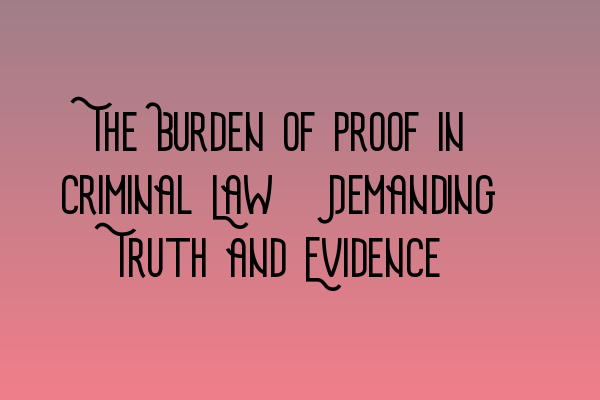The Burden of Proof in Criminal Law: Demanding Truth and Evidence
In criminal law, the burden of proof lies on the prosecution to establish the guilt of the accused. This means that before a person can be convicted of a crime, the prosecution must present evidence that proves their guilt beyond a reasonable doubt.
The concept of the burden of proof is crucial in criminal cases as it ensures fairness and protects individuals from being wrongfully convicted. The standard of proof required in criminal cases is significantly higher than in civil cases, as the potential consequences, such as loss of liberty, are more severe.
Under the criminal justice system, the prosecution carries the burden of proving each element of the crime charged. This includes establishing the actus reus (the guilty act) and the mens rea (the guilty mind) of the accused.
The burden of proof requires the prosecution to present evidence that is admissible, relevant, and credible. Admissible evidence is evidence that is legally acceptable to be presented in court. Relevant evidence is evidence that has a tendency to prove or disprove an issue in the case. Credible evidence is evidence that is trustworthy and reliable.
Presumption of Innocence: The Foundation of Criminal Law
The presumption of innocence is a fundamental principle in criminal law. It ensures that an accused person is considered innocent until proven guilty. This means that the burden of proof rests entirely on the prosecution, and the accused is not required to prove their innocence.
By placing the burden of proof on the prosecution, the law recognizes the fact that it is better to let a guilty person go free than to wrongly convict an innocent person. This principle is often summarized by the saying, “It is better that ten guilty persons escape than that one innocent suffer.”
The burden of proof is often a challenging task for the prosecution. They must gather and present evidence that convinces the judge or jury of the accused’s guilt beyond a reasonable doubt. This burden is intentionally high, as it helps minimize the risk of wrongful convictions.
The Standard of Proof: Beyond a Reasonable Doubt
Beyond a reasonable doubt is the highest standard of proof required in criminal cases. It means that the evidence presented must be so conclusive that there is no reasonable doubt in the minds of the judge or jury that the accused is guilty.
Reasonable doubt is not mere possible doubt, speculative, imaginary, or forced doubt. It is a doubt that is rational, logical, and reasonable based on the evidence presented. The prosecution must remove any reasonable doubt by presenting strong evidence and convincing arguments.
When evaluating the evidence, the judge or jury must consider the whole body of evidence, including witness testimonies, forensic evidence, expert opinions, and any other relevant evidence. The prosecution must address any conflicting evidence or alternative explanations that may create reasonable doubts.
Demystifying the Burden of Proof in Criminal Law
The burden of proof is an essential concept in criminal law, ensuring that justice is served and innocent individuals are protected. By placing the burden on the prosecution, it upholds the presumption of innocence and ensures that guilt is proven beyond a reasonable doubt.
If you are studying for the SQE (Solicitors Qualifying Examination) or interested in criminal law, it is crucial to understand the burden of proof and its significance. For further resources and preparation, consider exploring the following articles:
Expand your knowledge and grasp the complexities of criminal law to excel in your legal career. Stay informed and dedicated to upholding justice as a solicitor practicing criminal law.
